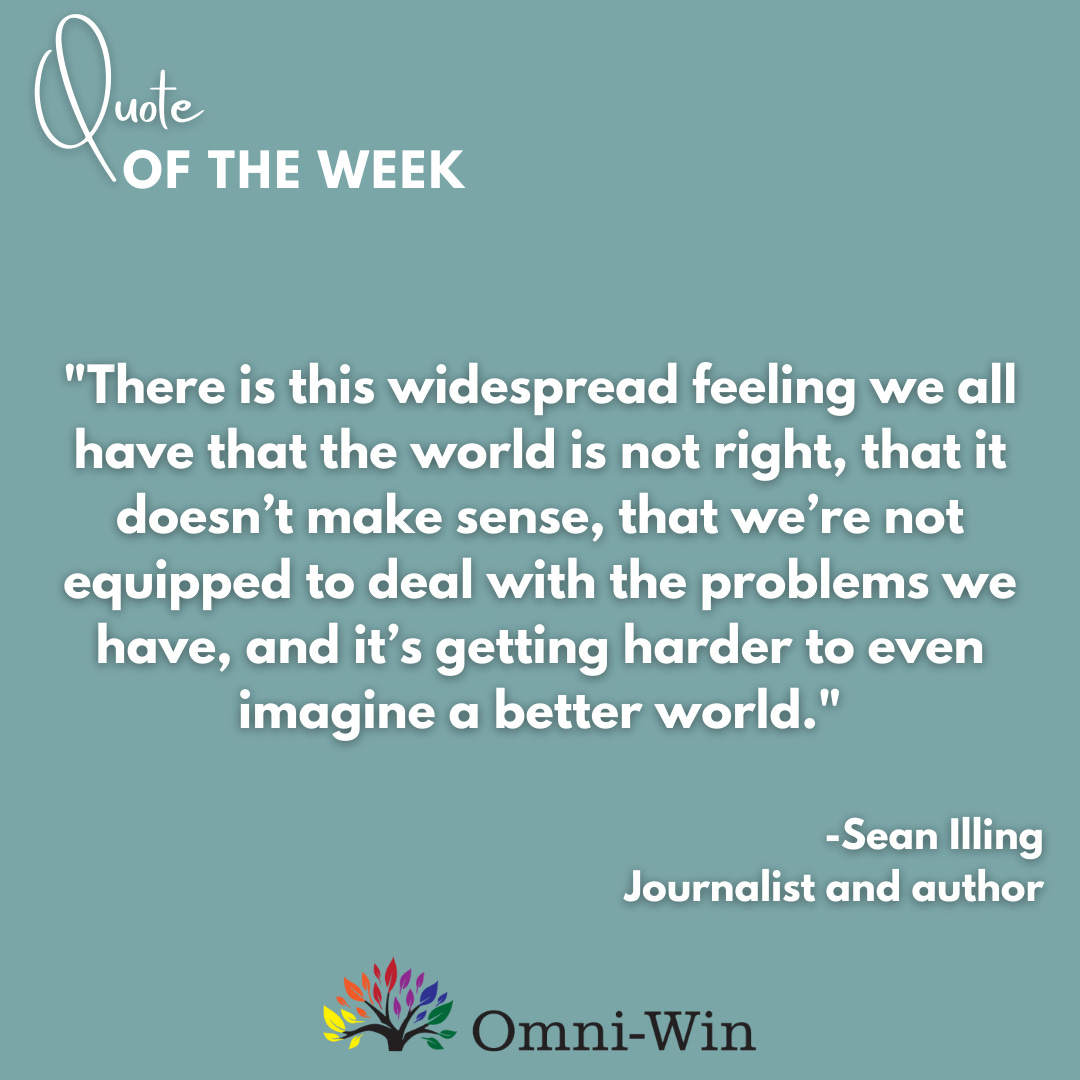Facing & Understanding the Sense of Hopelessness and Despair
There's a lot of scary stuff happening in the world, but there's light in the darkness
Key Takeaways:
Do what you must, but don't think you have to do it alone. There are no individual solutions to collective problems.
The work we face will take our whole lifetime, so do something you care about and can sustain.
It’s hard to trust that the future can be different from the past because we can't see it.
We all have cognitive biases: These are logical traps that keep us stuck.
This week, I’m talking about hopelessness and despair. I’m picking up from where I left off last week about how solutions are an illusion. We’re not trying to actually solve problems forever, but we’re trying to figure out how we want to be in relationship as we continue to solve problems.
I want to acknowledge that the sense of hopelessness and despair is real. Lots of scary stuff is happening in the world, and the trajectory doesn’t look good for certain things. In the next couple of essays, I’ll talk about the world situation and how I get to a place of reality-based optimism or what I call pessi-optimism.
My mind perks up every time someone says, “Our democracy’s having so much trouble. We don’t know what’s going on. We don’t know how to fix it. There aren’t any obvious solutions.” I’m always like, “Oh, are you kidding? There are many great solutions!”
A great example of this comes from a recent episode of Vox Conversations called “The Real Story of Don’t Look Up,” hosted by Sean Illing. The interview is with David Sirota, who created the concept behind the film.
Sean Illing talks about the meta-crisis and a clip he saw from Jonathan Rowson. He summarizes this situation well:
"There's this widespread feeling we all have that the world is not right, that it doesn't make sense, and we're not equipped to deal with the problems that we have, and it's getting harder to imagine a better world."
David Sirota responds with, “Yeah. It’s not an easy answer to that sense of hopelessness and despair.” He talks about the two scientists in the movie, and they capture two natural trains of thought that we have as rational people amid the global crises we’re facing.
On the one hand, Leonardo DiCaprio’s character is thinking, “Hey, things are bad, but if I try really hard, I’m going to be able to fix it. I can go get this system to start working.”
Jennifer Lawrence’s character holds the voice of, “Things are really bad, but I’m going to try and make it work. But if it doesn’t work, then I’m just going to give up ’cause it’s hopeless.”

Sirota says that these are rational responses to what’s going on. He adds a couple of important nuances. First of all, when there are no easy solutions, we have to do what we think we need to do. Still, he points out that there’s no individual solution to a collective problem. So the idea that I have to solve it is not totally true.
We’re also not getting instant gratification. We’re working on something, and we’re not getting the solution. It’s easy to give up, but this is lifetime work.
I can never figure out the source for this relevant quote anymore, but here it is roughly: Do what you feel like you need to be doing in your life, what’s important to you. Because everything important that needs to be done will take the rest of your life and probably beyond that. You might not see the solutions, so don’t do something that will burn you out or that you can only do for a little bit. Do something that you feel like you can do for the long term.
That’s what I’m doing right now, so welcome to my long-term Omni-Win Project! I understand the despair, and sometimes I really let myself feel that. But I recognized that I needed to do something. I realized this isn’t something I could do by myself, so this is a recruiting mission.
I can’t do it alone.
You can’t do it alone.
We can do it together in the giant collective system we’ve got going on here.
There’s a global consensus on one thing: shit ain’t working. So, what do we do about that?
I want to point out a couple of things around hopelessness. There are a couple of cognitive biases at play here. One of them is called the status quo bias. Given all the different options, we’ll do the thing that looks most like whatever’s going on.
We also have our loss aversion bias. The risk of losing the known makes it scary to step into something different. This bias is important because people aren’t content with what’s happening right now, but they aren’t opening up to, “Hey, what’s a better way of doing this? Let’s talk about it and raise our standards.”

Another part of the hopelessness is confirmation bias. If we believe things are broken and try to find examples of that, we will find confirmation.
So how do we hope for something different? There’s plenty of evidence that things haven’t been working or have been getting progressively worse, but some things are gradually getting better. There is hope.
I want to introduce a concept I heard through Adam Kahane. After doing some research, I found out it comes from Mesopotamia. Their idea? What’s in the past is ahead of us, and the things in the future are behind us.
The idea is that we are walking through time backward. We can see the past with total clarity. We have no idea where we’re going and that’s worth remembering when we’re trying to figure out what the future will look like. Can it look different than the past? Yeah, probably.
We don’t know what it looks like because we haven’t been there yet. But if we look forward into the past, we’ll see that things have changed a ton. The modern era is a few generations old, and we changed many things to get here.
We can keep changing things, and that’s important. I’m not trying to fluff you up here as we are in a serious meta-crisis. Daniel Schmachtenberger has really purveyed that concept, and that’s what I’m going to talk about in Wednesday’s essay.
If you prefer to watch your content, here’s a video on this essay:
You can find more information about the work I do in conflict transformation on my website: http://www.omni-win.com
You can schedule a call with me here: https://calendly.com/duncanautrey
Don’t forget to check out the rest of my posts as I discuss how we can work together to ensure we all win.
If you’d like to see more of these weekly round-up posts, subscribe to Omni-Win Visions here on Substack:
It would also be great if you could subscribe to my YouTube channel where you can watch more of my long-form content, authentic discussions, and weekly content:



